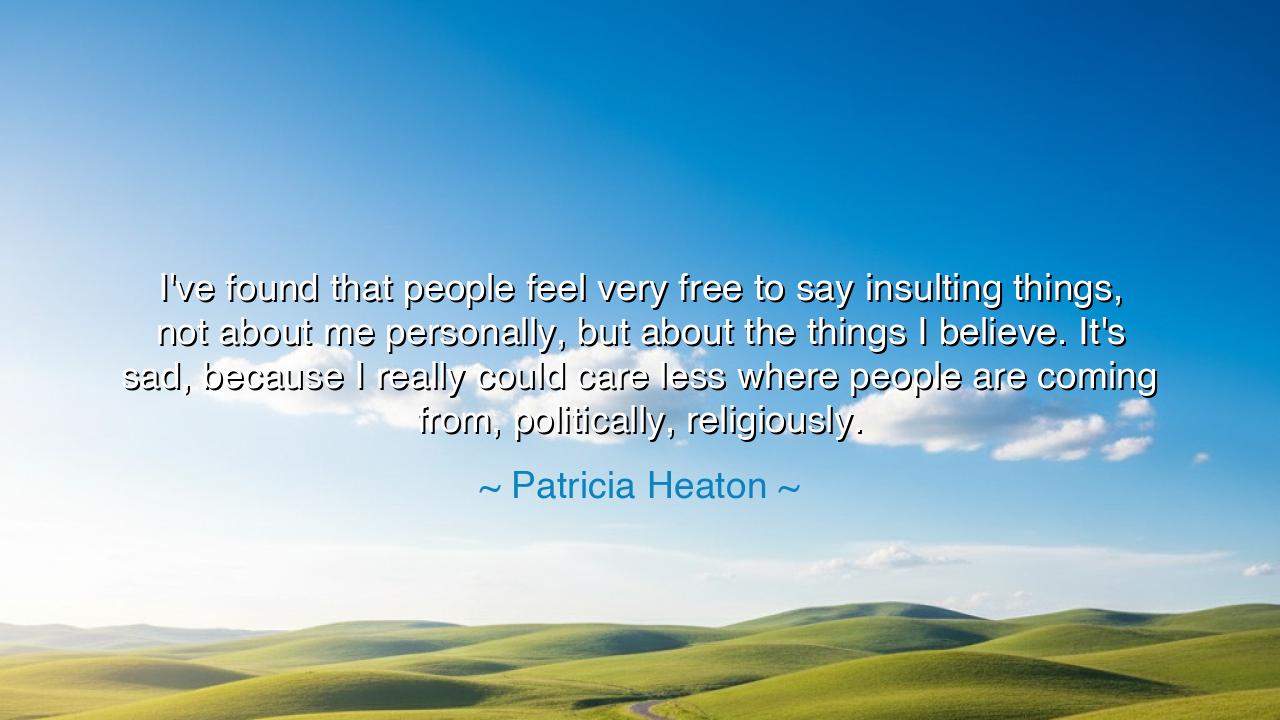
I've found that people feel very free to say insulting things
I've found that people feel very free to say insulting things, not about me personally, but about the things I believe. It's sad, because I really could care less where people are coming from, politically, religiously.






Hear the words of Patricia Heaton, spoken with sorrow and clarity: “I’ve found that people feel very free to say insulting things, not about me personally, but about the things I believe. It’s sad, because I really could care less where people are coming from, politically, religiously.” In these words lies a deep lament, not only for herself, but for the state of human discourse. For she reveals the tragedy that men and women, rather than meeting one another in respect, often choose contempt for what others hold sacred.
The ancients knew this pain. Socrates, who sought only truth through questioning, was condemned not for his person, but for his beliefs. He stood accused of corrupting the youth and dishonoring the gods, though his heart was fixed on wisdom. In him we see the pattern that Heaton names: the one who holds fast to conviction finds themselves insulted not for who they are, but for what they represent. And the sorrow is not only personal—it is a wound upon the whole community, for when beliefs cannot be spoken without scorn, the common ground of society begins to crumble.
Consider also the story of Galileo Galilei, who gazed at the heavens and declared that the earth moved around the sun. He, too, was mocked and silenced, not for his character, but for the beliefs he proclaimed. Those who insulted him believed they were defending truth, yet in their insulting words and deeds they revealed fear rather than wisdom. His trial, like the experiences Heaton describes, shows us that the tongue can become a weapon that wounds both the speaker and the hearer when respect is abandoned.
And yet, Heaton does not answer insult with hatred. She says, “I could care less where people are coming from, politically, religiously.” This is a declaration of freedom, for she chooses not to bind her love or respect to agreement. She teaches here the higher path: that one may honor another without sharing their creed, that one may listen without surrendering conviction. The sadness she feels is not in being disagreed with, but in seeing so few others choose this same generosity of spirit.
The lesson for us is powerful. Disagreement is inevitable; insult is not. To mock another’s beliefs is to close the door to understanding. To listen, even when we do not agree, is to honor the humanity we share. Heaton’s words remind us that contempt is the easy path, but respect is the higher one, requiring patience, humility, and courage. It is through respect that societies endure; it is through insult that they fracture.
Practical action follows: in your own speech, choose respect over scorn. When you meet one whose political views oppose your own, listen before judging. When you encounter one whose religious path is not yours, honor the sincerity of their faith. Do not sharpen your tongue into a blade of insult, but shape it into a bridge of understanding. This does not mean abandoning truth; it means speaking truth with dignity.
Thus, Patricia Heaton’s lament becomes a teaching for all who hear: that the true test of character is not how we treat those who agree with us, but how we speak to those who do not. It is easy to honor the beliefs we share; it is wisdom to honor the beliefs we cannot hold ourselves. Let us therefore rise above insult, so that respect may live, and so that even in our differences, the bonds of humanity remain unbroken.






AAdministratorAdministrator
Welcome, honored guests. Please leave a comment, we will respond soon